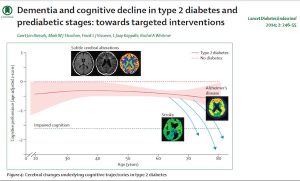Introduction: Literature documents the existence of a link between diabetes and cognitive impairment. Suffering from diabetes increases the risk of developing Alzheimer and vascular dementia. It is also known that among the various conditions that increase the risk of diabetes, obesity is one. On the other hand, there is scant evidence regarding the possibility that the link between diabetes and cognitive impairment may be bidirectional, meaning that the presence of cognitive deficit may make the management and prevention of diabetes more complicated. Objective: With the aim of understanding the utility of investigating the influence that cognitive deficit has on the management and prevention of diabetes, an evaluation of compliance difficulties with dietary therapy attributable to intellectual disability was carried out. The influence that psychoeducational interventions may have was verified. Material and Method: We conducted a descriptive pilot study involving 16 patients with varying degrees of cognitive deficit, hospitalized at the structure of ASL RM 6 known as Villa Albani. The sample consists of 2 males and 1 female with diabetes, 6 males and 7 females with obesity following a dietary regimen. For a year, in addition to monitoring weight and glycemic values, the dysfunctional behaviors implemented during the meals were observed and recorded and infringements of food rules. Psycho-educational interventions were planned, based on the application of positive reinforcement behavioral techniques, to reduce dysfunctional behaviors and enhance rule adherence. All family caregivers of enrolled patients conducted periodic interviews with the multidisciplinary team. Conclusions: The statistical analysis of the collected data, shows that there is a difficulty for patients to adhere to dietary therapy. The frequency of appearance of dysfunctional behaviors and infringement of dietary rules, is reduced with the application of psycho-educational interventions. What emerged from this small-scale study indicates the feasibility of a subsequent study to be conducted on a larger sample.


